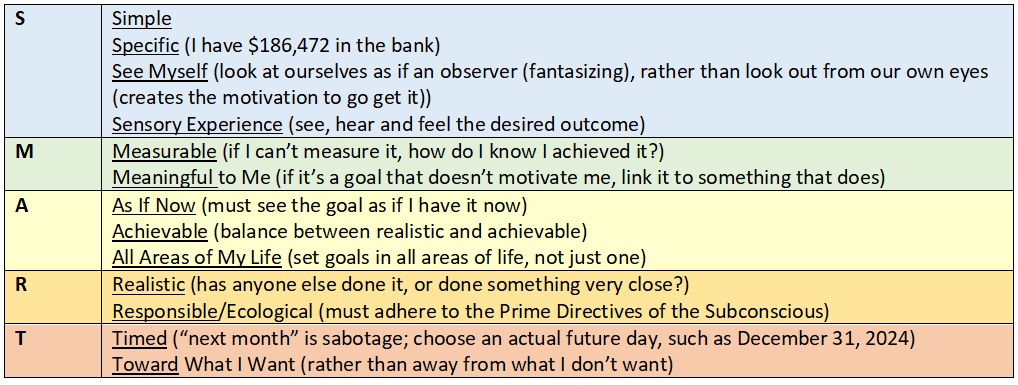SMART Goal Setting Success
Achieving the success you dream of doesn't have to feel like climbing an unending mountain. It's time to simplify your journey with SMART goal-setting. One of the largest roadblocks on your path to achieving greatness is not knowing where to start, or how to navigate setbacks when they occur. If you create a roadmap for your project, a roadmap that is customized to you, your project, and your goals, you'll have a much easier time making choices and decisions along the way. You'll also have a much higher probability of actually completing your project. That roadmap is also known as SMART goal-setting.
Elements of a SMART Goal

SMART is an acronym that originally stood for Specific, Measurable, Achievable, Relevant, and Time-bound. Each of these elements play a crucial role in helping you plan, track, and achieve your goals with precision and satisfaction, ensuring your personal growth.
Since this model was originally developed, NLP practitioners have actually added a few elements to the original acronym. These additions have strengthened and improved the model, by incorporating additional needed elements to help people succeed. Let's go through these elements one at a time.
S: Simple, Specific, See Myself and Sensory
The first attribute of SMART goal-setting is S, which stands for the following:
Simple Sometimes a goal is so involved that we psych ourselves out before we even get started. If a goal or outcome is complex, break it down into much smaller pieces so that you can more easily focus on one piece at a time.
Specific Make your goal or outcome as specific as you can. A poorly defined goal would be something like "I want to succeed," and a very specific goal would be, "I want to increase my company's sales by 25% in the next six months." Just like you plan a trip, knowing your destination is the first step in getting there.
See Myself There is a phrase amongst NLP practitioners that "the conscious is the goal-setter, and the subconscious is the goal-getter". One way to build subconscious motivation to achieve something, is to use a practice called "dissociation". This is where we see ourselves as if from the perspective of an observer. If we are working towards a goal and imagine ourselves "in" the results of that goal, our subconscious will believe we've already achieved it. If we've already achieved it, there's no need to strive for achieving it again. On the other hand, when we dissociate from the goal and instead create a mental image of ourselves as if we're watching from the outside, the subconscious knows that it hasn't happened yet. Furthermore, the subconscious will then work even harder to make all the pieces come together to achieve it. This single difference often makes the difference between success and failure.
Sensory The conscious mind relies heavily upon sensory input; in fact all our conscious thoughts occur AFTER our sensory information (sight, sound, smell, taste and touch) has come in through the subconscious. If the conscious and subconscious are to work together to achieve a goal, we need to go beyond just cognitive thought and give the subconscious all the sensory details it needs to make it reality. So when we picture ourselves in the outcome we want, don't just look at some objective goal. Consider what it'll look like, what it'll sound like, what it'll taste and smell and feel like. Make it as real as you possibly can. That'll strongly influence your ability to achieve it.
M: Measurable and Meaningful
Measurable is the next characteristic. It encourages setting goals that can be tracked. Once a specific goal has been set, establish criteria for how you will measure its success. For example, if your goal is to increase company sales, a measuring criteria could be the monthly sales figure.
Meaningful reflects a need for your goal to be important to you, rather than you simply carrying it out because it's important to someone else. All of us have people around us with goals and ambitions of their own, and we often feel like we should help them in those efforts. However, to really get fired up about achieving something on our own (particularly if we don't have the support of friends, family or coworkers), we need to make sure that goal or outcome has great meaning to us. That fuels our motivation to achieve it. If we have a goal or outcome which we cognitively want to achieve but aren't really jazzed about (say, finishing our taxes on time or losing that last 10lbs), tie that outcome to a reward of some kind that we ARE jazzed about. For instance, if we want to get those taxes done on time, make sure we tie that goal to a reward of some kind, which we DO want. Then as we picture ourselves in the outcome, the picture will include finishing the former while enjoying the latter.
A: As If Now, Achievable and All Areas
Achievable It is important to ensure your goals are realistic and within your reach to avoid setting yourself up for failure and disappointment. An achievable goal could be "Increase my company's sales by 15%" as opposed to an unachievable goal such as "Become a billionaire in a month."
As If Now This is another missing element for many people's goal-setting. They put themselves into a position of "wanting" something, and focus on how much they want it. But look at this from the subconscious point of view. If you already "want" a goal, then that condition has already been satisfied, and your subconscious' work is done. On the other hand, if you create a goal or outcome and envision yourself as already having it (being sure to use dissociation!), then your subconscious will know it needs to get busy working to make it happen. That builds a strong motivation to make progress.
All Areas Another thing that people often miss, is that a goal in one area of their lives is incompatible with goals or even current conditions in other areas of their lives. For instance, if you want to train for running a marathon AND you want to spend more time with your kids, those two goals may be incompatible if either goal is set separate from the other. In this instance, making a goal that incorporates BOTH elements, would be much more likely to succeed.
R: Relevant and Responsible
Relevant Your goals should be aligned with your wider life objectives. For instance, if your long-term dream is to become a published author, setting a goal to finish writing a book is relevant. Also make sure your goal is relevant to YOU rather than to someone else. It's pointless to set goals simply to make someone else happy.
Responsible Your goal must also be responsible in terms of protecting your wellbeing, and the wellbeing of others. Referring to the Prime Directives of the Subconscious can remind us of those details. It also needs to adhere to your existing Values, Beliefs and Identity. If we create a goal which is out of alignment with any of these elements, we'll encounter a lot of resistance to achieving that goal. In fact, many times we won't be aware of a mis-alignment until we set a goal and keep experience resistance to achieving it. That would be time to review which values, beliefs and/or identities are problematic, and change them so that we can proceed with the goal.
T: Time-Bound and Toward
Time-bound refers to the need to work with a deadline or specific date by which your goal will be achieved. This creates urgency and prompts action rather than procrastination. For instance, if we have a goal with a deadline of "someday", we probably won't ever put in much effort to reach it. On the other hand, if we create a date by which to reach a goal, we'll be much more motivated to do the work required to get there by that date.
Towards There are two types of motivation: towards motivation and away motivation. Away motivation is when we are strongly motivated to get away from a bad condition or situation. That might seem like a great way to achieve a goal, except the further away we get, the less motivation we have. Conversely, when we are working Towards a goal, the closer we get, the stronger our motivation to finish.
Break A Big Project Down Into
Small Bite-Sized Pieces
One of the big reasons that people fail to reach a goal, is that they start at the beginning. While that logically makes sense, it actually sets us up for failure. We get into a project doing what seems to make sense at the time, and suddenly we realize that a lot of other things needed to have already happened before we move forward. There is actually a word for this: dependencies. For instance, if we want to build a new house, we might get started with all our plans for how to decorate and how to lay out the rooms and what features we want in the kitchen. Except all those things depend upon preparing the site, and creating a strong foundation. If we don't do those things first, we can't do any of the items we've already planned. And that's where people get frustrated, and quit.
A much better way to proceed, is to start with a very detailed picture of your outcome, and then work backwards from that complete goal. Instead of breaking the project down into tasks to do at any given time (ie, starting at the beginning and moving forward), think in terms of what needs to be completed along the way. For instance, consider your final goal, due by a specific date. What needs to be done 3 months prior, then 6 months prior, then 9 months prior, etc? That helps us keep track of where we need to be at any given time. As we get closer to the current time (ie, at the start of the project), reduce that interval down to smaller increments, and think in terms of smaller tasks. Then put it all down on paper. This becomes your roadmap for achieving your project. It also helps turn it into a doable projects, because we already know what we need to be doing, and when.
Get SMARTer About Your Goals
The ability to set SMART goals is not an innately born talent, but a learned skill. With practice, you can master this powerful tool, no matter how overwhelmed, frustrated, or defeated you may feel currently.
Embracing the SMART goal-setting method can boost your feelings of competency and commitment as you work towards your goal. You are essentially drafting your own road map towards success, and every little achievement gives a reward - an incredible sense of satisfaction.
The road to success is not always smooth and will often require assistance. This is where a coach comes into play. A success coach can serve as a vital partner, offering guidance, and support, enhancing your dedication to your SMART goals.
Remember, we all need assistance sometimes. Asking for a coach's help can speed you towards your goal, and help you get there easier than you would manage on your own. Coaches often provide the catalyst for achievement that we've been missing, much like a missing jigsaw piece completing a puzzle.
Success is within your reach. SMART goal-setting and a dedicated coach makes it more tangible, more manageable. So, go ahead, dream big, set SMART goals, and see yourself soar beyond your dreams. You're absolutely capable of it. If you'd like help with creating and reaching SMART goals, contact me today and let's set up that first step towards your success.
|
Shopping Cart |
|
Contact Me For Help Reaching Your Goals

When you're ready to move forward, push through obstacles and make real progress towards your goals, Contact Me today.
New Products and Services Request Form
Do you have a product or service request that you don't already see listed here? I'd love to hear your ideas! Please feel free to either Contact Me or fill out my new Product and Service Request Form.
Thanks for your suggestions!
